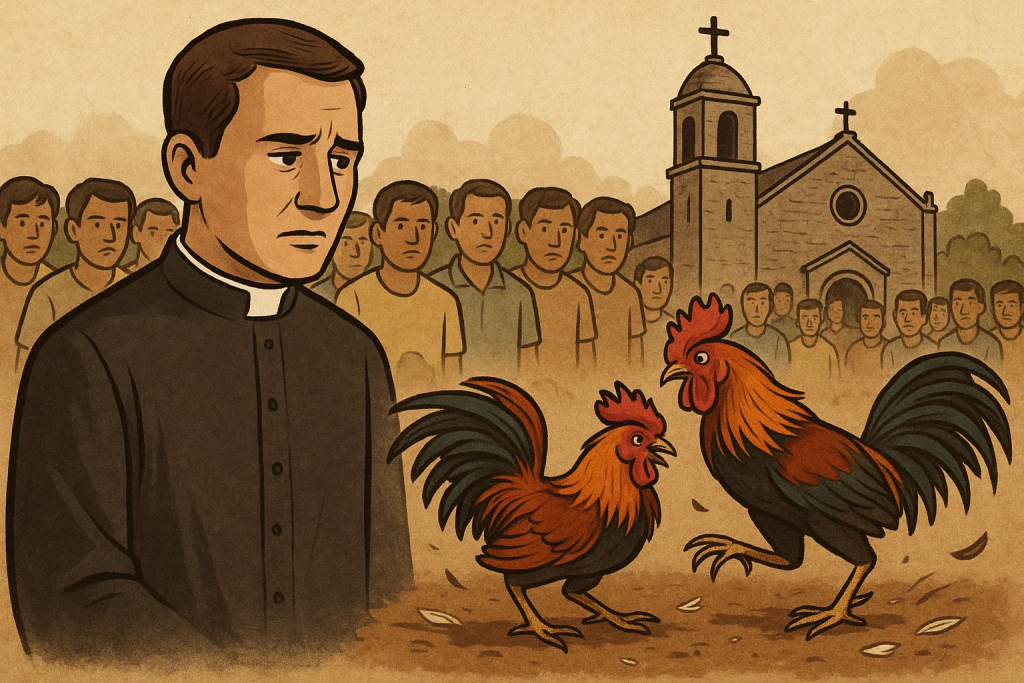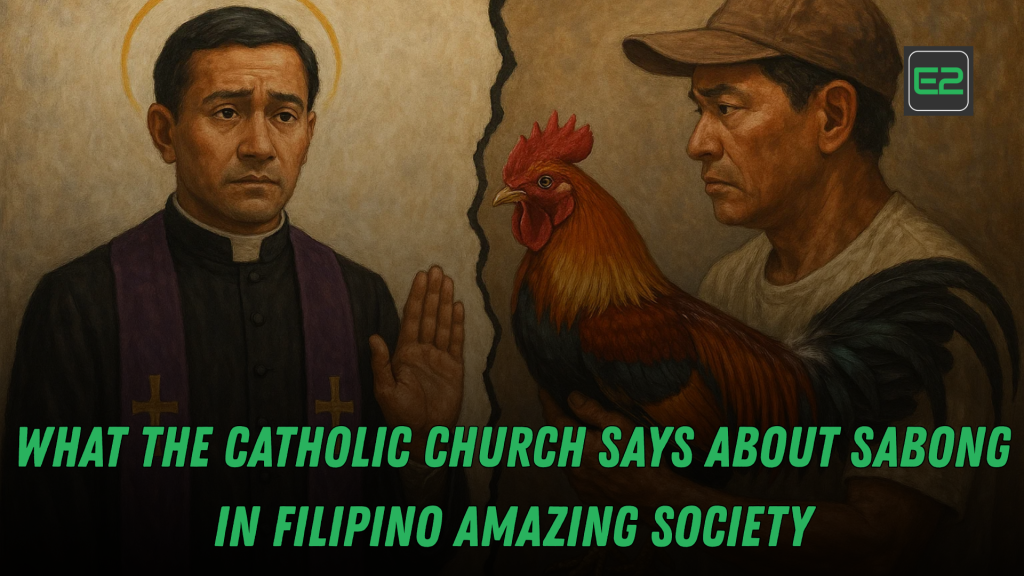One of the most vocal groups in this debate is the Catholic Church, which has expressed concerns over the impact of sabong on Filipino society, particularly regarding its moral implications and effect on the community. Sabong, or cockfighting, is an ancient tradition that has been part of Filipino culture for centuries. This competitive sport, where roosters fight each other while spectators place bets, is deeply rooted in the social fabric of the Philippines. However, as with any tradition, it raises ethical, moral, and spiritual questions.
This article explores what the Church says about sabong in Filipino society, delving into its ethical considerations, its stance on gambling, and its impact on Filipino values. We will also examine how these views are being received by the general public and what this means for the future of sabong in the Philippines.
Table of Contents
The Catholic Church’s Ethical Stance on Sabong
The Church’s Views on Animal Welfare
One of the primary concerns raised by the Catholic Church regarding sabong is the moral treatment of animals. The Church has consistently advocated for the compassionate treatment of all living creatures. In the Catechism of the Catholic Church, it is stated that animals are God’s creation and should be treated with respect. With sabong, however, roosters are forced into violent situations where they are often injured or killed, raising questions about whether such practices align with Christian values of stewardship and care for creation.
- Cruelty to Animals: The violence inherent in sabong, where roosters are encouraged to fight with sharp blades strapped to their legs, is seen as cruel and unnecessary. The Church views this as a violation of the ethical obligation to care for animals, promoting suffering in exchange for entertainment and profit.
- Respect for Life: The Church advocates for respecting all forms of life, whether human or animal. Sabong, by subjecting animals to physical harm, conflicts with the moral teachings that emphasize kindness and respect for the lives of all creatures.

Gambling and Its Effects on Society
Another key concern of the Catholic Church is the relationship between sabong and gambling. Sabong is often tied to significant betting activities, which the Church believes can lead to social and moral issues within Filipino society. Gambling addiction is a major concern, as it can destroy families, drain personal savings, and even foster criminal behavior.
- The Dangers of Addiction: The Catholic Church has warned against the moral and social dangers of gambling. Sabong, as a form of legalized gambling, can encourage destructive behavior, particularly among vulnerable individuals who may struggle with controlling their impulses.
- Social Consequences: The Catholic Church highlights that gambling often results in negative consequences for families and communities. The addiction to betting on cockfights can undermine family structures, leading to financial instability and emotional strain.
The Church’s Call for Moral Reforms
In response to these concerns, the Catholic Church has called for moral reforms to address the harmful impacts of sabong on Filipino society. These reforms include the following:
- Stricter Regulations: The Catholic Church advocates for the government to implement stricter regulations on sabong and other forms of gambling. They believe that while sabong is deeply ingrained in Filipino culture, it should be practiced within a framework that respects human dignity and protects vulnerable individuals.
- Promoting Education and Awareness: The Catholic Church also emphasizes the importance of educating the public about the moral and social consequences of gambling. By raising awareness, the Church hopes to foster a culture that values ethical behavior over the thrill of gambling.

The Church’s Advocacy for Alternatives
Promoting Responsible Entertainment
Instead of sabong, the Church advocates for alternative forms of entertainment and recreation that do not involve violence or gambling. Religious leaders suggest that Filipinos could embrace sports or activities that promote teamwork, health, and positive values, such as:
- Community-Based Sports: Encouraging young people to participate in sports like basketball, volleyball, or soccer, which emphasize teamwork and respect for others.
- Recreational Activities: Organizing community events that provide entertainment without the harmful consequences associated with gambling, such as charity runs, concerts, or cultural festivals.
Supporting Moral Leadership
The Church also believes in the importance of moral leadership in shaping Filipino society. By promoting ethical behavior in public and private life, religious leaders hope to steer people away from activities like sabong that can foster unethical behavior. Leaders are encouraged to set positive examples for their communities, fostering values like respect, integrity, and compassion.
Animal Welfare vs. Amazing Tradition: The Ethics Debate on Cockfighting
The Public’s Reception of the Church’s Stance
Divided Opinions in Filipino Society
While the Catholic Church’s stance on sabong resonates with many, particularly those who are concerned about the ethical and social consequences of gambling, there are also many Filipinos who view the sport as a vital part of their cultural heritage. Sabong is deeply ingrained in Filipino social life, and for many, it is a long-standing tradition that provides entertainment and income.
- Support for the Church’s Position: Those who support the Church’s views on sabong argue that it is time for Filipino society to rethink the tradition, especially as the negative impacts of gambling become more apparent. They believe that preserving Filipino values means making ethical choices that do not come at the expense of animal welfare or social harmony.
- Opposition to the Ban on Sabong: On the other hand, some Filipinos believe that sabong is a harmless tradition and that it should be allowed to continue as a form of cultural expression. They argue that regulating the sport better, rather than banning it outright, could address many of the Catholic Church’s concerns.

The Future of Sabong in Filipino Society
A Shift Toward Ethical Practices?
The growing conversation around sabong, coupled with the Catholic Church’s advocacy for ethical reforms, could lead to changes in the way the sport is practiced in the Philippines. There may be a shift toward more humane practices in cockfighting, such as eliminating the use of blades or enforcing better care standards for the roosters involved. However, achieving this would require significant buy-in from both the government and local communities.
Potential for Regulation and Reform
Rather than an outright ban, a more feasible solution could be implementing stronger regulations to ensure that sabong is conducted responsibly. This could include measures to:
- Limit Betting Activities: Regulate gambling activities associated with sabong to prevent addiction and exploitation.
- Enhance Animal Welfare Standards: Ensure that the animals involved are treated with respect and that their well-being is prioritized.
What are your thoughts?
The Catholic Church’s stance on sabong highlights the ongoing ethical and moral questions surrounding the practice of cockfighting in Filipino society. While sabong has deep cultural roots, the Church’s concerns about animal welfare and gambling addiction challenge society to consider more responsible and ethical alternatives. The debate is likely to continue, but it is clear that the issue of sabong in Filipino society will need to be addressed with compassion, regulation, and a commitment to moral principles.
The Catholic Church in the Philippines has expressed concerns over sabong (cockfighting) due to its ethical implications, particularly regarding animal welfare and the social consequences of gambling. The Church argues that cockfighting, which involves animal cruelty and encourages gambling, goes against Christian values of respect for life and stewardship. It advocates for stricter regulations on the sport and emphasizes the need for alternatives that promote moral values, such as community-based sports and recreational activities. While some Filipinos see sabong as a cultural tradition, the Church’s stance calls for a shift toward more humane and responsible practices. Ultimately, the future of sabong depends on how Filipino society balances tradition with ethical considerations.
As society continues to evolve, it is essential for Filipinos to balance cultural traditions with ethical considerations. Whether through reforming the sport or embracing alternative forms of entertainment, the future of sabong will depend on how it aligns with the values that define Filipino society.
Frequently Asked Questions (FAQ’s)
1. What is the Catholic Church’s position on sabong?
The Catholic Church opposes sabong due to concerns over animal cruelty and the social and moral consequences of gambling.
2. Why does the Church focus on gambling in relation to sabong?
The Catholic Church is concerned that sabong promotes gambling addiction, which can lead to financial ruin, emotional distress, and strained family relationships.
3. Does the Church want to ban sabong entirely?
While the Church advocates for reform and stricter regulations, it does not necessarily call for an outright ban but emphasizes the need for ethical practices and protection for animals.
4. What alternatives does the Church suggest to sabong?
The Church suggests promoting community-based sports and recreational activities that do not involve violence or gambling, offering a healthier alternative to sabong.
5. How can the Philippines address the concerns around sabong?
The Philippines can address the concerns by implementing stricter regulations on animal welfare and gambling associated with sabong, and promoting more humane practices in the sport.
